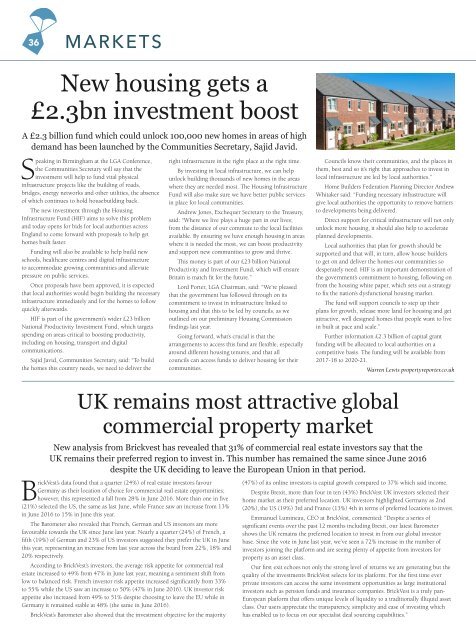Property Drop Issue 8
Create successful ePaper yourself
Turn your PDF publications into a flip-book with our unique Google optimized e-Paper software.
36 MARKETS<br />
New housing gets a<br />
£2.3bn investment boost<br />
A £2.3 billion fund which could unlock 100,000 new homes in areas of high<br />
demand has been launched by the Communities Secretary, Sajid Javid.<br />
Speaking in Birmingham at the LGA Conference,<br />
the Communities Secretary will say that the<br />
investment will help to fund vital physical<br />
infrastructure projects like the building of roads,<br />
bridges, energy networks and other utilities, the absence<br />
of which continues to hold housebuilding back.<br />
The new investment through the Housing<br />
Infrastructure Fund (HIF) aims to solve this problem<br />
and today opens for bids for local authorities across<br />
England to come forward with proposals to help get<br />
homes built faster.<br />
Funding will also be available to help build new<br />
schools, healthcare centres and digital infrastructure<br />
to accommodate growing communities and alleviate<br />
pressure on public services.<br />
Once proposals have been approved, it is expected<br />
that local authorities would begin building the necessary<br />
infrastructure immediately and for the homes to follow<br />
quickly afterwards.<br />
HIF is part of the government’s wider £23 billion<br />
National Productivity Investment Fund, which targets<br />
spending on areas critical to boosting productivity,<br />
including on housing, transport and digital<br />
communications.<br />
Sajid Javid, Communities Secretary, said: “To build<br />
the homes this country needs, we need to deliver the<br />
right infrastructure in the right place at the right time.<br />
By investing in local infrastructure, we can help<br />
unlock building thousands of new homes in the areas<br />
where they are needed most. The Housing Infrastructure<br />
Fund will also make sure we have better public services<br />
in place for local communities.<br />
Andrew Jones, Exchequer Secretary to the Treasury,<br />
said: “Where we live plays a huge part in our lives;<br />
from the distance of our commute to the local facilities<br />
available. By ensuring we have enough housing in areas<br />
where it is needed the most, we can boost productivity<br />
and support new communities to grow and thrive.<br />
This money is part of our £23 billion National<br />
Productivity and Investment Fund, which will ensure<br />
Britain is match fit for the future.”<br />
Lord Porter, LGA Chairman, said: “We’re pleased<br />
that the government has followed through on its<br />
commitment to invest in infrastructure linked to<br />
housing and that this to be led by councils, as we<br />
outlined on our preliminary Housing Commission<br />
findings last year.<br />
Going forward, what’s crucial is that the<br />
arrangements to access this fund are flexible, especially<br />
around different housing tenures, and that all<br />
councils can access funds to deliver housing for their<br />
communities.<br />
Councils know their communities, and the places in<br />
them, best and so it’s right that approaches to invest in<br />
local infrastructure are led by local authorities.”<br />
Home Builders Federation Planning Director Andrew<br />
Whitaker said: “Funding necessary infrastructure will<br />
give local authorities the opportunity to remove barriers<br />
to developments being delivered.<br />
Direct support for critical infrastructure will not only<br />
unlock more housing, it should also help to accelerate<br />
planned developments.<br />
Local authorities that plan for growth should be<br />
supported and that will, in turn, allow house builders<br />
to get on and deliver the homes our communities so<br />
desperately need. HIF is an important demonstration of<br />
the government’s commitment to housing, following on<br />
from the housing white paper, which sets out a strategy<br />
to fix the nation’s dysfunctional housing market.<br />
The fund will support councils to step up their<br />
plans for growth, release more land for housing and get<br />
attractive, well designed homes that people want to live<br />
in built at pace and scale.”<br />
Further information £2.3 billion of capital grant<br />
funding will be allocated to local authorities on a<br />
competitive basis. The funding will be available from<br />
2017-18 to 2020-21.<br />
Warren Lewis propertyreporter.co.uk<br />
UK remains most attractive global<br />
commercial property market<br />
New analysis from Brickvest has revealed that 31% of commercial real estate investors say that the<br />
UK remains their preferred region to invest in. This number has remained the same since June 2016<br />
despite the UK deciding to leave the European Union in that period.<br />
BrickVest’s data found that a quarter (24%) of real estate investors favour<br />
Germany as their location of choice for commercial real estate opportunities;<br />
however, this represented a fall from 28% in June 2016. More than one in five<br />
(21%) selected the US, the same as last June, while France saw an increase from 13%<br />
in June 2016 to 15% in June this year.<br />
The Barometer also revealed that French, German and US investors are more<br />
favourable towards the UK since June last year. Nearly a quarter (24%) of French, a<br />
fifth (19%) of German and 23% of US investors suggested they prefer the UK in June<br />
this year, representing an increase from last year across the board from 22%, 18% and<br />
20% respectively.<br />
According to BrickVest’s investors, the average risk appetite for commercial real<br />
estate increased to 49% from 47% in June last year, meaning a sentiment shift from<br />
low to balanced risk. French investor risk appetite increased significantly from 33%<br />
to 55% while the US saw an increase to 50% (47% in June 2016). UK investor risk<br />
appetite also increased from 49% to 51% despite choosing to leave the EU while in<br />
Germany it remained stable at 48% (the same in June 2016).<br />
BrickVest’s Barometer also showed that the investment objective for the majority<br />
(47%) of its online investors is capital growth compared to 37% which said income.<br />
Despite Brexit, more than four in ten (43%) BrickVest UK investors selected their<br />
home market as their preferred location. UK investors highlighted Germany as 2nd<br />
(20%), the US (19%) 3rd and France (13%) 4th in terms of preferred locations to invest.<br />
Emmanuel Lumineau, CEO at BrickVest, commented: “Despite a series of<br />
significant events over the past 12 months including Brexit, our latest Barometer<br />
shows the UK remains the preferred location to invest in from our global investor<br />
base. Since the vote in June last year, we’ve seen a 72% increase in the number of<br />
investors joining the platform and are seeing plenty of appetite from investors for<br />
property as an asset class.<br />
Our first exit echoes not only the strong level of returns we are generating but the<br />
quality of the investments BrickVest selects for its platform. For the first time ever<br />
private investors can access the same investment opportunities as large institutional<br />
investors such as pension funds and insurance companies. BrickVest is a truly pan-<br />
European platform that offers unique levels of liquidity to a traditionally illiquid asset<br />
class. Our users appreciate the transparency, simplicity and ease of investing which<br />
has enabled us to focus on our specialist deal sourcing capabilities.”


















